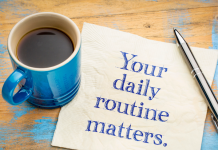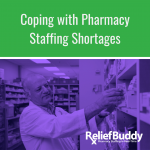
success and tackle these challenges? Are you calm and composed or volatile and frustrated? How can you handle difficult patients and staff shortages while continuing to manage workflow and doctor call-backs in a timely manner? Working long hours coupled with the added stress, protocols, and additional services around the pandemic, can lead to burnout.
Your health (physical and mental) and job satisfaction are affected when your stress and cortisol levels start rising.
Here are 5 tips to help you survive a busy shift and avoid burnout:
- Exercise: Let’s move our bodies! We all know the benefits of exercise and how it can help you cope with stressful situations. Exercise pumps up your endorphins and combats high cortisol levels. Even a brisk walk before your shift or some morning stretches can put you in check before a busy shift. Take the stairs or park your car at the far end of the lot to squeeze in some extra steps. It will make a difference and you will feel it, so make it a priority to get moving!
- Stay hydrated and eat often: Your brain is strongly influenced by your hydration status. Quite often headaches or migraines can be triggered by dehydration. Keep some healthy snacks in your work drawer so you have something quick to turn to. During busy days, you may not have time to microwave your leftovers or eat your salad. Pre-wash and cut up some vegetables and fruits so that you can snack on them throughout the day. You don’t want to resort to chocolate bars and candy, since they will only trigger an insulin response and give you the dreaded sugar crash. Be prepared and have your snacks ready – you’ll appreciate it. Try not to go long periods without eating as it can affect your blood sugar levels and make it difficult to focus. Don’t forget to stay hydrated and drink lots of H2O!
- Sleep well: Sleep is an insurance card for a busy day at the pharmacy. Try to get a full 8 hours of sleep every night no matter what happens in your day. Coming home after a late-night shift can make it difficult to unwind and settle into bed – but practicing good sleep hygiene can help you make the transition a lot faster:
– Go to sleep and wake up at the same time every day
– Stop checking your phone and using electronic devices 1 hour before sleeping
– Avoid caffeinated drinks after lunchtime and, if needed, drink decaf
– Do something relaxing before bed, like reading a book or taking a warm bath - Do one thing at a time, and write things down: It is easy to start a shift with only a few follow-ups to do, but then as the day goes on things pile up and become more stressful. Pharmacists have an innate sense of multi-tasking and often try to do several things simultaneously. The reality is, you will get interrupted. You might be on the phone with a doctor when a patient comes in for an early refill, or someone needs help. It will happen, and you have to be prepared to manage the situation. Remember you cannot do everything at once. Properly focusing on one thing is better than ineffectively dividing your attention into many things. Doing one thing at a time also helps relieve feelings of panic, and anxiety. Keeping a notepad close by to write things down will help prioritize your time and allow you to get through that list. Another effective strategy is the “one-minute test” for prioritizing. If a task will take 1 minute or less to complete, then do it right away and get it off your to-do list. This could be something like a documentation issue, a quick callback, or a faxed note. You will feel better when your to-do list is lean and prioritized.
- Delegate and Ask for Help: Pharmacists often feel the onus to do everything themselves, but the reality is that we need help in order to get our jobs done effectively. Your staff is there to help you, so leverage your resources to build an effective team. By utilizing your staff to their full potential, you will make the environment less stressful. Don’t be afraid to ask for help. Give staff the responsibility and accountability to be in charge of certain tasks and this will free up your time and reduce your stress levels in the process.














